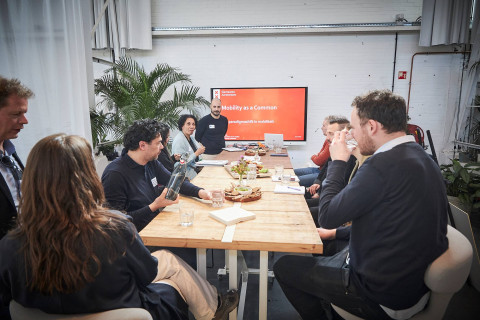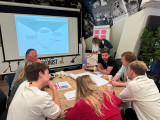In the coming decades, urban population growth and a rising demand for mobility options will cause strain on our public spaces. The city of Amsterdam will counteract this trend by making private car ownership less attractive for its citizens, while making sure there are enough, well facilitated, alternative modes of transport. One could think of investments in (more) public transport, and the welcoming of shared mobility providers. Currently, some market players are making use of the latter and sharing cars and sharing mopeds are becoming part of the streetscape. Is this enough?
Mobility as a Commons
On the 23th of March, Diederik Basta and Jop Pék from the municipality of Amsterdam’s innovation department, hosted a working session on the concept of; Mobility as a Commons (MaaC). They introduced this concept by pointing out that currently, we’re not ‘sharing’ our modes of transport but we’re just ‘renting’ them from private companies. This raises a couple of concerns; these parties exist purely to maximize profits, they own and sell user data, their fleet of vehicles is not spread evenly throughout the city, and because it’s only available for those who can afford the service, it’s not inclusive for all.
The municipality is now exploring how to move away from these market mechanisms and facilitate car sharing solutions based in local ownership. This summer, they’ll experiment with pilots in which modes of transport are perceived as a ‘Commons’ and cooperatively owned and used by a group of local residents. Their goal is to gather insights on how to facilitate this form of locally organized mobility in the best way possible and pave the way for emerging initiatives.
Paradigm shifts
For this new alternative to succeed, drastic innovation is needed in which public authorities identify and alter their role. That’s why Diederik and Jop are also turning inwards and critically reflecting on the current premises from which they’re acting. Only then, you’ll be able to innovate in a way that you’re breaking free from your current paradigm and its effects. Because they are of such importance, I would like to quickly summarize the three relevant premises:
- People act out of self-interest; we assume mistrust. People need control and governance to reinforce the common good. Its effects: A government mistrusting its citizens and legal sealing of documents and procedures.
- The municipality owns public space. Public space should be designed and managed by experts to ensure quality, consistency and efficiency of functionalities. Its effects: Struggles with public participation and a focus on efficiency and functionality, instead of social interaction.
- The municipality is responsible for a well-functioning mobility system. Public space makes way, and more urban mobility makes people richer and happier. Its effects: Private parties push the mobility system and the government facilitates this, and traveling for work and other (social) activities is the norm.
Reactions from the participants
Next to inspiring the working session participants, Diederik and Job wanted to ignite an active conversation with the diverse group in front of them. They wanted to show the parties at the table how important it is to realise from what kind of premises and paradigm you’re currently ‘innovating’, but they were also curious what others thought of their upcoming project.
A big theme during the discussion was the fact that this ‘commons’ thinking is finding its way within different themes like the energy- and data transition. Energy cooperatives are emerging at a fast rate and this topic is receiving a lot of research and attention from energy companies at the moment. The same goes for cooperative ownership and use of data, as an alternative to protection and the commercial use of data. The different domains should be actively learning from each other, as learnings should be easily transferable. Furthermore, the group discussed the painful dilemma of the innovation department of the municipality. Their critical stance against their own policies is remarkable, but they need to find a balance where the pilot and its results will be refreshing and creative, as well as applicable in current policies as soon as possible. Finally, the group advised the presenters to; pay special attention to groups of citizens who have less time and resources available to organize themselves, write down in detail all administrative rules and obstructions that counteract these initiatives, and to not forget the power of private parties altogether; with a clear problem definition, they are able to organise and act at a fast rate.
What’s next?
In the coming months, the project’s final preparations and consideration will be implemented. Through the Horizon 2020 (GEMINI) project, The municipality of Amsterdam will cooperate with parties like Townmaking, Smart Innovation Norway, and our partner Cenex Nederland. Together they will guide and research local initiatives within Amsterdam (e.g. de Pijp, Tuindorp Oostzaan, Spaarndammerbuurt), activate a so called ‘Experimenteerregeling’ and create a plug and play system for future local initiatives. Diederik and Jop will incorporate the comments and discussions from this working session, and we’ll make sure to have them share their first learnings with the Amsterdam Smart City network later in 2023.
Do you want to know more about this topic, or would you like to get in contact with Diederik Basta or Jop Pék? You can contact me via pelle@amsterdamsmartcity.com, and I’ll connect you!





